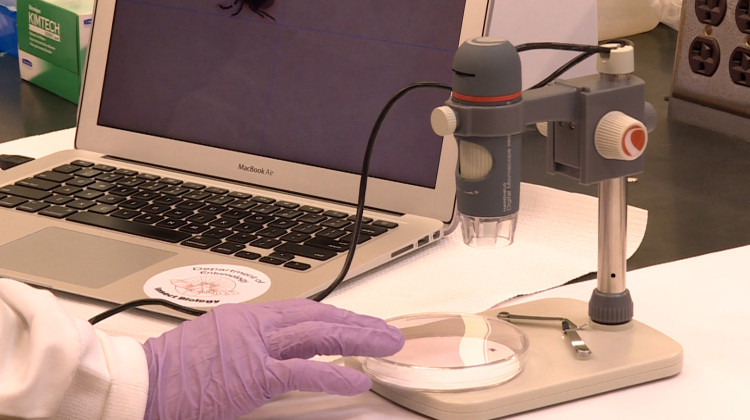
Purdue University postdoctoral researcher Maria Murgia makes a deer tick easier to see by connecting the microscope to a laptop computer. Deer ticks, also known as blacklegged ticks, can carry Lyme disease.
Rebecca Thiele / IPB NewsIs there an outbreak of Lyme disease in Indiana this year? A listener wanted to know.
Lee Green is the Indiana Department of Health’s senior medical entomologist. He said there hasn’t been a spike in tick illnesses this year, but overall they’ve been increasing over the past two decades.
Green said we’re seeing more ticks as their habitat and food sources grow. The blacklegged or deer tick, for example, is now found in every county of the state and can transmit Lyme disease.
“So those ticks like wooded areas and they seem to increase with deer populations," he said.
As we develop land, people also come in contact with ticks more often. Tick experts at Purdue say climate change could also create a better environment for ticks — more of the warm, humid weather when ticks are most active.
Ticks carry diseases by biting infected hosts like deer, mice or rabbits. So just because you got a tick bite doesn’t necessarily mean that you’ll get an illness.
It also takes time for a tick to transmit that disease to you — how long depends on the type of tick and the pathogen. Green said the blacklegged tick could be attached for two days before it transmits Lyme, but other diseases work much faster.
Join the conversation and sign up for the Indiana Two-Way. Text "Indiana" to 765-275-1120. Your comments and questions in response to our weekly text help us find the answers you need on statewide issues.
Green said outbreaks of tick illnesses don’t play out the same way as diseases from mosquitoes like West Nile virus. That’s because mosquitos have a much faster life cycle and you can have multiple generations in one year.
“And that virus between the birds and mosquitoes can be explosive in the summertime. Ticks are completely different. Ticks live a long time, two to three years. So those trends with pathogens are much slower," Green said.
If you find a tick on you, Green said it may not be worth it to get it tested to see if it was carrying a disease. It could take several days to get the results back.
“We don't want anybody, if they start to develop symptoms, to wait on tick testing to seek medical care. What we're concerned about is the pathogen within you. And no matter what those tick results were, if we did test them, it's not a good answer,” he said.
That’s because tick testing can either provoke undue fear or give people a false sense of security.
READ MORE: Lack of data leaves Indiana doctors unprepared for tick diseases.
If it’s positive for a disease, it still doesn’t mean that tick had enough time to transmit the disease to you. If it’s negative, Green said there’s still a possibility that you were also bitten by another tick carrying disease that has since detached.
Experts say the best way to protect yourself from ticks is to avoid wooded or grassy areas, use bug spray with DEET, and do thorough tick checks often.
Rebecca is our energy and environment reporter. Contact her at rthiele@iu.edu or follow her on Twitter at @beckythiele.
 DONATE
DONATE






 Support WFYI. We can't do it without you.
Support WFYI. We can't do it without you.